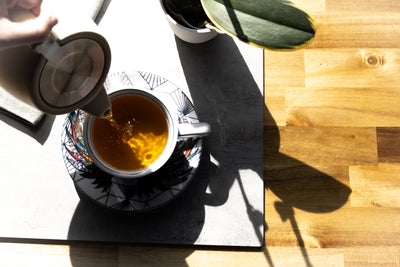Hibiscus tea, also known as "sour tea" or "roselle tea," has a rich history and is enjoyed for both its delightful flavor and potential health benefits. The tea is made from the dried petals of the hibiscus flower, scientifically known as Hibiscus sabdariffa. While the exact origins of hibiscus tea are uncertain, it is believed to have originated in North Africa and Southeast Asia.
Hibiscus tea is often consumed for its potential cooling and thirst-quenching properties. In many cultures, hibiscus tea is traditionally enjoyed as a refreshing beverage during hot summer months. Its natural ability to hydrate and cool the body has made it a popular choice in tropical regions.
Taste
Hibiscus tea is celebrated for its vibrant color and refreshing taste. The tea has a tart and tangy flavor profile, with hints of cranberry-like notes. Many people enjoy hibiscus tea for its natural sweetness and pleasant acidity, which makes it a popular choice for both hot and iced tea preparations. Its distinct flavor also makes it a versatile ingredient that can be incorporated into various recipes, such as cocktails, smoothies, and even desserts.
Making Hibiscus Tea
To prepare hibiscus tea, start by boiling water. Once the water reaches a boil, remove it from the heat and add dried hibiscus petals to the water. Allow the tea to steep for about 5 to 10 minutes, or until the water turns a deep red color. The longer the steeping time, the stronger the flavor will be. You can sweeten the tea with honey or add a squeeze of lemon juice for a tart twist. Hibiscus tea can be enjoyed hot or cold, making it a versatile and refreshing beverage.
Potential Health Benefits of Hibiscus
Drinking hibiscus tea offers several potential benefits. Firstly, it is a rich source of antioxidants, including flavonoids and anthocyanins, which help protect the body against harmful free radicals and oxidative stress. These antioxidants are known for their potential anti-inflammatory properties, which may contribute to various health benefits. Hibiscus tea is also believed to help in maintaining healthy blood pressure levels. Some studies suggest that regular consumption of hibiscus tea may have a modest effect in reducing systolic and diastolic blood pressure.
Furthermore, hibiscus tea has been associated with potential cholesterol-lowering effects. Some research indicates that drinking hibiscus tea may help lower levels of LDL cholesterol (commonly known as "bad" cholesterol) and triglycerides. However, more research is needed to establish these effects conclusively. Additionally, hibiscus tea is believed to support weight management by inhibiting the production of amylase, an enzyme that aids in carbohydrate digestion.
Hibiscus tea has been associated with potential benefits for digestive health. It is believed to possess mild laxative properties, promoting regular bowel movements and alleviating constipation. The tea's anti-inflammatory properties may also help soothe the digestive system and reduce gastrointestinal discomfort.
Recommended Precautions
As Hibiscus is known to have a mild diuretic effect, individuals taking diuretic medications should consult with their healthcare practitioner before drinking hibiscus tea. Additionally, pregnant women and those with an allergy to plants in the Malvaceae family (such as marshmallow or hollyhock) should consult with their healthcare practicioners as well.
Summary
In summary, hibiscus tea is a flavorful and refreshing beverage with potential health benefits. Its rich antioxidant content, potential effects on blood pressure and cholesterol levels, and its reputation as a natural thirst-quencher make it a popular choice for many. By preparing hibiscus tea correctly, consuming it in moderation, and being mindful of any personal health considerations, you can enjoy the unique flavors and potential advantages of hibiscus tea as part of your overall wellness routine.

